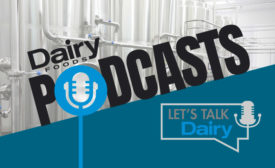Operations
Third-party verification and inspection required for usage of 3-A logo.
Read More
A big future for Kaurina Kulfi
Dallas-based company continues to see growth in Indian frozen novelty product.
February 21, 2025
What is the future of rigid and flexible packaging in dairy?
Ever-increasing demand, combined with unique properties of dairy products, is leading to widespread innovation.
February 20, 2025
How ice cream stacks up as a clean-labeled food
Ice cream is the only food intended to consumed frozen.
February 18, 2025
Episode 49 — NERCON R&D manager joins “Let’s Talk Dairy” podcast
Jeff Falash discusses packaging trends.
February 3, 2025
EQUIPMENT SHOWCASE
Equipment suppliers highlight the latest advancements in lab testing kits
January 31, 2025
DairyFoods.com Exclusive: Dairy processors face a food safety threat
Consistent actions are necessary to reduce foodborne illness risk.
January 30, 2025
Inspection and detection systems continue to evolve
The need for the dairy industry to evaluate, understand these systems continues to grow.
January 28, 2025
Stay ahead of the curve. Unlock a dose of cutting-edge insights.
Receive our premium content directly to your inbox.
SIGN-UP TODAYCopyright ©2025. All Rights Reserved BNP Media.
Design, CMS, Hosting & Web Development :: ePublishing












